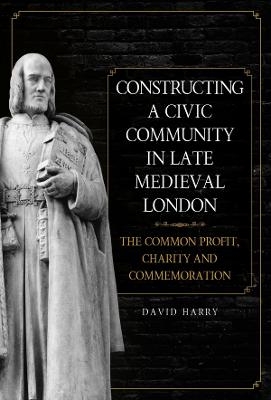
Constructing a Civic Community in Late Medieval London
The Common Profit, Charity and Commemoration
Seiten
2019
The Boydell Press (Verlag)
978-1-78327-378-2 (ISBN)
The Boydell Press (Verlag)
978-1-78327-378-2 (ISBN)
An examination of the growth of civic power in the turbulent arena of late medieval London.
In the late fourteenth century, London's government, through mismanagement and negligence, experienced a series of crises. Relationships with the crown were tested; competing factions sought to wrest power from the hands of the once all-powerful victualling guilds; revolt in the streets in 1381 targeted the institutions of royal as well as civic power; and, between 1392 and 1397, King Richard removed the liberties of the city and appointed his own wardensto govern in place of the mayor of London.
This book examines the strategies employed by the generation of London aldermen who governed after 1397 to regain control of their city. By examining a range of interdisciplinary sources, including manuscript and printed books, administrative records, accounts of civic ritual and epitaphs, the author shows how, by carefully constructing the idea of a civic community united by shared political concerns and spiritual ambitions, a small number of men virtually monopolised power in the capital. More generally, this is an exploration of the mentalities of those who sought civic power in the late Middle Ages and provokes the question: whygovern, and for whom?
DAVID HARRY is Lecturer in History at the University of Chester.
In the late fourteenth century, London's government, through mismanagement and negligence, experienced a series of crises. Relationships with the crown were tested; competing factions sought to wrest power from the hands of the once all-powerful victualling guilds; revolt in the streets in 1381 targeted the institutions of royal as well as civic power; and, between 1392 and 1397, King Richard removed the liberties of the city and appointed his own wardensto govern in place of the mayor of London.
This book examines the strategies employed by the generation of London aldermen who governed after 1397 to regain control of their city. By examining a range of interdisciplinary sources, including manuscript and printed books, administrative records, accounts of civic ritual and epitaphs, the author shows how, by carefully constructing the idea of a civic community united by shared political concerns and spiritual ambitions, a small number of men virtually monopolised power in the capital. More generally, this is an exploration of the mentalities of those who sought civic power in the late Middle Ages and provokes the question: whygovern, and for whom?
DAVID HARRY is Lecturer in History at the University of Chester.
Introduction: Common profit and charity in late medieval London
Radical London, 1376-1386
Reconfiguring political authority
Civic ceremony and staging the limits of authority
The exemplary dead
Spiritual authority and the common profit
Print and the pursuit of the common profit
Conclusion
Bibliography
| Erscheinungsdatum | 24.01.2019 |
|---|---|
| Zusatzinfo | 1 b/w illus. |
| Verlagsort | Woodbridge |
| Sprache | englisch |
| Maße | 156 x 234 mm |
| Gewicht | 468 g |
| Themenwelt | Geisteswissenschaften ► Archäologie |
| Geschichte ► Allgemeine Geschichte ► Mittelalter | |
| Geschichte ► Teilgebiete der Geschichte ► Religionsgeschichte | |
| Sozialwissenschaften | |
| ISBN-10 | 1-78327-378-X / 178327378X |
| ISBN-13 | 978-1-78327-378-2 / 9781783273782 |
| Zustand | Neuware |
| Haben Sie eine Frage zum Produkt? |
Mehr entdecken
aus dem Bereich
aus dem Bereich
eine neue Geschichte des Mittelalters
Buch | Hardcover (2023)
C.H.Beck (Verlag)
38,00 €


